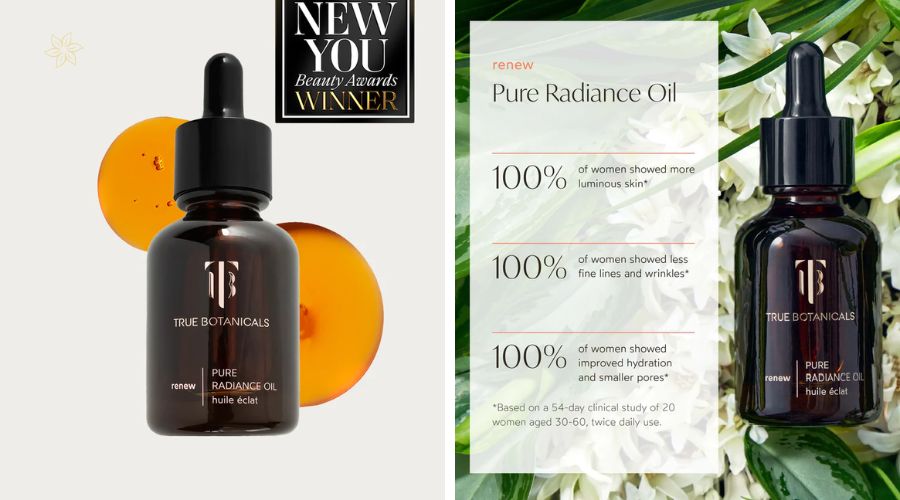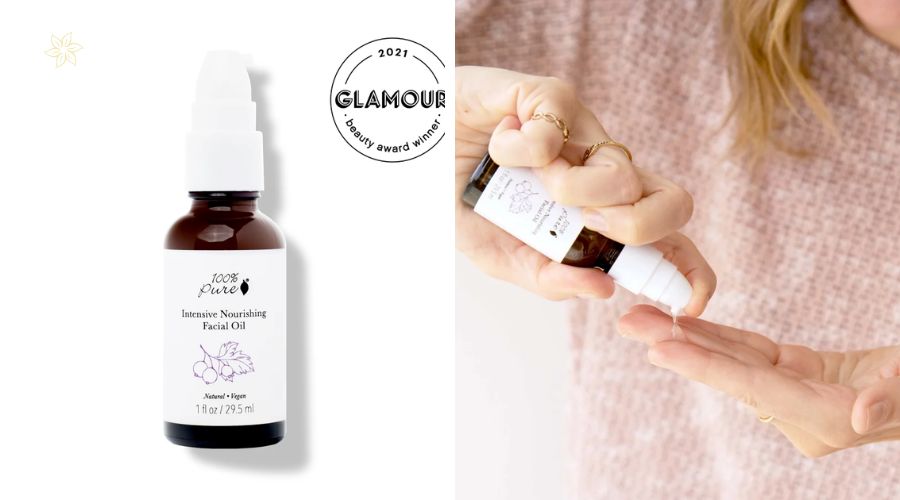
Wine lovers know that a glass a day can keep wrinkles away. For the non-drinkers, you can still enjoy the same benefits of the grapes through grapeseed oil.
Grapeseed oil is an all-natural product extracted from grape seeds during the winemaking process. Though it may not taste as good as your favorite bottle of wine, grapeseed oil can benefit your health and skin thanks to its antioxidant-rich, antimicrobial, and anti-inflammatory properties.
Let’s dive into grapeseed oil benefits for skin, how to use it, and how can it help you maintain a healthy skincare routine.
What Is Grapeseed Oil?
Grapeseed oil is a byproduct of winemaking. Tiny seeds are left behind as the grapes are pressed to make wine. These seeds are then cold-pressed to extract oil. The cold-press method retains the oil’s natural skin-promoting compounds, such as omega fatty acids. The oil is also high in antioxidants, just like grapes.
10 Grapeseed Oil Benefits For Skin
Packed with omega fatty acids, antioxidants, Vitamin E, and other health-promoting compounds, grapeseed oil can do wonders for your skin when used topically. Let’s take a look at some of the top grapeseed oil benefits for the skin.
Hydrates skin and reduces dryness
Do you have dry skin that gets flaky almost as soon as you finish oiling yourself? Maybe you need to try grapeseed oil to combat the dryness. According to studies, grapeseed oil has hydrating qualities due to its high concentration of PUFAs, unsaturated fatty acids, and antioxidants. These hydrating qualities help to maintain normal skin moisture and have soothing effects.
Just like olive oil, grapeseed tends to offer better viscoelastic and hydration effects than chemical-containing products. Additionally, grapeseed oil is absorbed better than olive oil, leaving behind less of a greasy residue, meaning it won’t clog your pores.
Helps fight acne
Another significant benefit of grapeseed oil for the skin is that it can control acne due to its high levels of linoleic acid. This is an omega-6 fatty acid that helps unclog pores. Acne is mainly caused by a deficiency in linoleic acid. So when you apply grapeseed oil on your skin, it increases this fatty acid helping to cut back on breakouts.
Lightens acne scars
If you’re prone to acne and the condition has left you with scars, using grapeseed oil for the skin can help to clear them. Sunspots also heal faster due to the Vitamin E and linoleic acid found in grapeseed oil.
The oil can also decrease the formation of keloid scars: raised, enlarged scarring commonly caused by severe burns, cuts, or acne.
Defends the skin against sun damage
The various antioxidants in grapeseed oil can protect your skin against sun damage thanks to its ability to help defend against oxidative stress. However, don’t replace your daily sunscreen with this oil.
Tightens your skin and minimizes fine lines and wrinkles
Grapeseed oil contains proanthocyanidin, flavonoids, carotenoids, phenolic acids, tannins, and stilbenes that may have anti-aging and anti-inflammatory effects. Polyphenols also help combat premature aging and wrinkles while boosting circulation. As such, you can use grapeseed oil for skin tightening, as its natural astringent properties make the skin look tighter and more youthful.
May help support wound healing
There’s some evidence that grapeseed oil can help wounds heal faster when applied topically. This is because the oil enhances the synthesis of vascular endothelial growth factor, which forms connective tissue. The antimicrobial qualities of the oil also fight pathogens helping to prevent infections in wounds.
Can improve hyperpigmentation and symptoms of melasma
A study found evidence that grapeseed extract can help treat chloasma/melasma when taken in pill form. Melasma is a condition that causes skin hyperpigmentation and is often difficult to treat.
Moisturizes and balances the skin
Grapeseed oil is full of Vitamin E, which is excellent for locking moisture into the skin. The vitamin softens and hydrates the skin’s outer layer as the oil’s fatty acid components fortify the skin barrier. This leaves your skin smooth and balanced.
Evens skin tone
Proanthocyanidin is a powerful antioxidant ingredient found in grapeseed oil. This antioxidant makes the skin tone more even and enhances your skin’s brightness.
Prevents free-radical damage
As already mentioned, grapeseed oil has excellent antioxidant abilities that protect your skin protection free-radical scavenging and environmental aggressors such as pollution.
What Are the Side Effects of Grapeseed Oil? (H2)
There aren’t any known side effects or risks of using grapeseed oil. However, if you want to start using grapeseed oil for your body, it’s best to consult a dermatologist first. It’s also advisable to do spot testing by applying a drop of the oil on the inside of your forearm to check if you are reacting to it.
If you’re allergic to grapes or their extracts in any form, it’s best to avoid the oil altogether. Experts also warn to use a different oil if you:
- have a blood disorder
- are prepping for surgery
- take blood-thinning meds
How Do I Use Grapeseed Oil on My Skin? (H2)
To get the most grapeseed oil benefits for your skin, you can use it in two ways: applying it directly to your skin or taking grapeseed oil extract by mouth, either in liquid or capsule/pill form.
Here’s how to best use grapeseed oil for your face and body:
- To moisturize your face: Use grapeseed oil alone or mix a few drops into your favorite natural face oils/creams. You can also combine it with aloe vera, shea butter, coconut oil, or rose water.
- To remove makeup: Use this oil to remove makeup before cleansing and moisturizing your skin.
- To moisturize your body: Apply a few drops of grapeseed oil on your body to hydrate and moisturize your skin.
- To treat acne: Apply a small amount of grapeseed oil on your face after cleansing—preferably with a natural face cleanser.
- To tighten your skin and for anti-aging effects: Apply several drops of the oil on your face in the morning and before bed. Do this daily, and you’ll start seeing good results in due time. The oil works better if used together with other anti-aging essential oils and ingredients like jojoba oil and pomegranate seed extract. Dap a small amount of grapeseed oil on any dark circles under your eyes to help reduce puffiness.
- To moisturize your hair: Apply grapeseed oil on your scalp to de-frizz hair and moisturize your scalp.
Best Skincare Products With Grapeseed Oil
There are so many skincare products that contain grapeseed oil available today. However, not all are natural or good for your skin. Here are our top recommendations for skincare products with grapeseed oil.
True Botanicals Pure Radiance Oil

True Botanicals Pure Radiance Oil is an award-winning natural moisturizing facial oil. The oil contains Omega-3 fatty acids, 14 easily absorbable seed oils (including grapeseed), algae extract, and astaxanthin. This blend helps deliver more hydrated, visibly plumped, and youthful-looking skin.
Since the oil contains seed oils (which have a smaller molecular profile than nut oils), it’s highly absorbable and doesn’t clog pores. It, therefore, permeates the skin leaving it moisturized. The oil also helps reduce the appearance of fine lines and wrinkles.
True Botanicals pure radiance oil is naturally scented with jasmine, neroli, and rose and will leave you smelling heavenly.
The face oil is hypoallergenic, non-comedogenic, and MADE SAFE and Leaping Bunny certified. It’s best suited for people with combination or dry skin.
100% Pure Intensive Nourishing Facial Oil

100% Pure Intensive Nourishing Facial Oil is an excellent day moisturizer made with a blend of Black Currant Oil, Vitamin E, Rosemary Essential Oil, and Lavender Essential Oil. it also contains a high concentration of anti-aging antioxidants, including grapeseed. These ingredients work flawlessly together to provide you with long-lasting hydration without clogging pores.
This face oil is ultra-lightweight and easy to absorb, making it a great choice for anyone with sensitive, oily, or acne-prone skin.
Grapeseed is an inexpensive natural byproduct of grape seeds. With consistent use, you’ll experience significant grapeseed oil benefits for your skin, such as hydration, moisturization, anti-aging effects, skin tightening, protection from the sun, and more. So if you’ve been asking yourself, is grapeseed oil good for your skin? We’re confident that this article has given you the answer!
Looking for more organic products for your skincare routine? Check out these 15 natural skincare products we recommend.
Frequently Asked Questions
Is Grapeseed Oil Good for Your Skin?
Yes, grapeseed oil is good for your skin. It contains anti-aging antioxidants, omega fatty acids, Vitamin E, and other health-promoting compounds that leave your skin moisturized, hydrated, and balanced.
Does Grapeseed Oil Build Collagen?
Grapeseed oil is rich in Vitamin E, that aids in the production/restoration of collagen. Increased collagen improves your skin tone.
How Long Does It Take for Grapeseed Oil To Work on Skin?
Grapeseed extract capsules take several weeks or months to improve the appearance of your skin. Some research suggests that acne may start clearing in as little as two weeks if you apply the oil twice a day.
Can Grapeseed Oil Lighten Dark Spots?
Grapeseed contains Vitamin E and linoleic acid content that helps to lighten skin discolorations like dark spots, acne scars, and sunspots.
Sources
- Lin T, et al. (2018). Anti-Inflammatory and Skin Barrier Repair Effects of Topical Application of Some Plant Oils. https://www.mdpi.com/1422-0067/19/1/70
- Downing d, et al. (1986). Essential fatty acids and acne. https://www.jaad.org/article/S0190-9622(86)70025-X/pdf
- Nayak B, et al. (2011). Wound-healing Properties of the Oils of Vitis vinifera and Vaccinium macrocarpon. https://onlinelibrary.wiley.com/doi/10.1002/ptr.3363
- Yamakoshi J, et al. (2004). Oral intake of proanthocyanidin-rich extract from grape seeds improves chloasma. https://onlinelibrary.wiley.com/doi/10.1002/ptr.1537

![]() Stella - Writer
Stella - Writer
Stella is a writer and mother from Thika, Kenya.
Her love for nature and the beautiful Kenyan outdoors has inspired Stella to consciously make an effort to lead a more sustainable, eco-friendly lifestyle.


